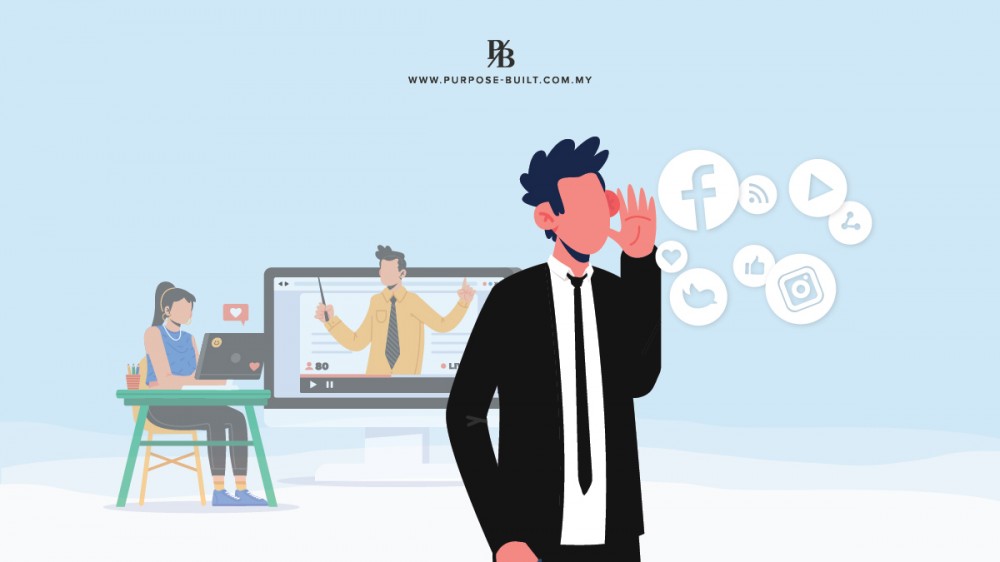



The current COVID-19 pandemic has greatly impacted the revenues of brands and businesses across the globe. Offline marketing campaigns would attain fewer results as physical stores remain closed and Controlled Movement Order (MCO) is still being enforced. With the limited course of action available to market products and services, what can brands do during these times of crisis?
Brands should make use of this time to do Social Listening. Some may question what is Social Listening and why should brands practice this; our Business Development Manager, Matt Gabriel who has prior experience with social listening shares his insights on this topic below.
1. What is Social Listening?
Social listening is the art of monitoring or listening to conversations and interactions the public is having on various social media platforms such as Facebook, Instagram, Twitter, YouTube, etc. Social listening does not work with a social listening tool or platform. There are different kinds of social listening tools available to suit a company’s needs and budget. A brand can implement social listening by subscribing to a social listening tool which is AI-driven, that allows a brand to be able to track conversation on different social media platforms.
One way that brands adopt social listening is through creating keywords. Let’s say for example that Gamuda wants to track its competitor mentions in social media. What they would need to do is to create their competitor brand keywords (as many as they want) and they can start tracking any mention of their competitors based on the keywords they created. Hence anytime a competitor keyword is mentioned on a social media platform, it will be captured by the social listening tool.
2. Why is Social Listening Important?
Social listening is important because in general brands ought to know how much their share of voice (SOV) is in social media or what the net sentiment people are having about or saying about a brand. The best way to do that is to see or monitor exactly what the public is saying about your brand. If I am McDonald’s and I just launched a new burger. Wouldn’t I want to know what people are saying about my new product? If supposing the sentiment towards my new product is bad, it would be very helpful for me to understand why.
3. What are the benefits of Social Listening for brands?
Social listening is a great way for brands to engage with customers by seeing exactly what they say about that brand. By knowing how customers like to engage or talk about a brand, a brand can use that information to create content that resonates with their customers by creating better engagement posts on facebook, twitter or Instagram.
Social listening can help a brand find out its pain points. For instance, perhaps a customer has negative feedback about the colour or packaging about a product. If a brand sees a trend of increased negative feedback, that might trigger them to make some changes.
Just like how social listening can tell a brand about its pain points, a brand can also learn about their features that customers like. For example, there could be positive comments about the pricing of a product. That could tell a brand that they have priced their product appropriately.
Social listening is a great way to monitor competitors. If a competitor brand is talked about a lot on social channels, other brands would normally want to find out what gives that brand a competitive advantage. This could help in research or product development ideas.
4. Is there a difference between Social Listening and Social Monitoring?
In my opinion, social listening and social monitoring is the same. A one-word answer I would give someone who asks me about social listening is that it means monitoring conversations on social media channels.
5. Are there any Social Listening Applications or sites that you would recommend?
There are many sites available on the WWW and there are many blog posts and blog sites with numerous articles dedicated to the subject. Perhaps this can be a good site to get people to find out more about social listening - https://influencermarketinghub.com/social-media-listening-tools/
This is a good site that shows the reader the 20 top social listening tools for 2020. There is background information for each tool and pricing plans.
In a situation of crisis, social listening could be very useful for brands to check the sentiment or conversations people are having online or on social media channels. MOH for example would be using social listening right now to track the real time chatter and conversations netizens are having. That will let them and the government know about key concerns that netizens are having.
Related articles you might like



